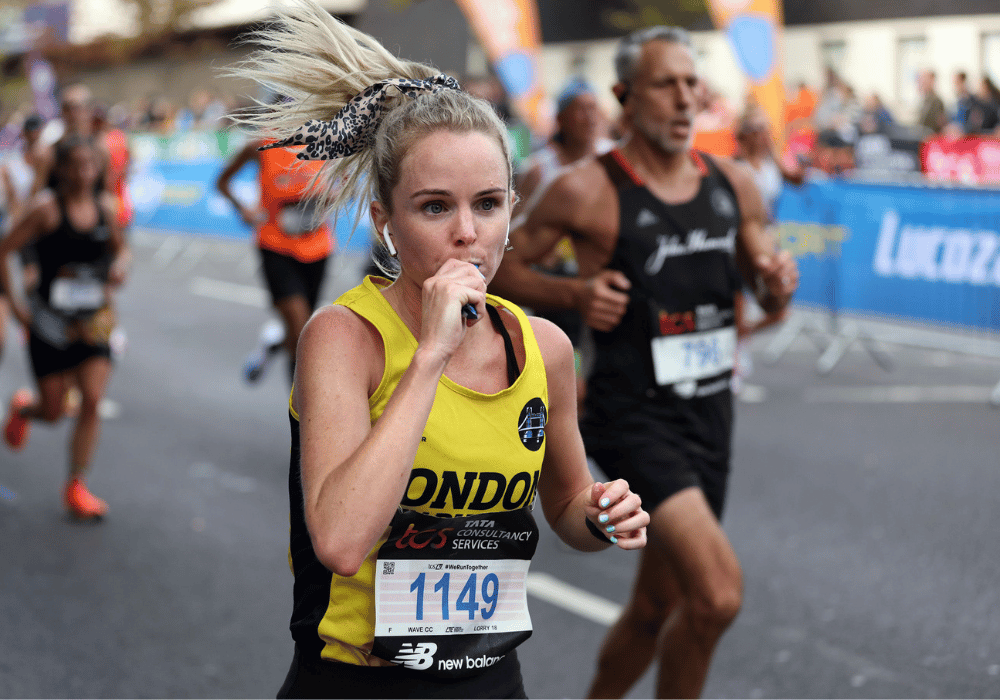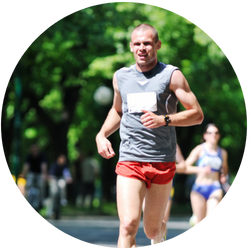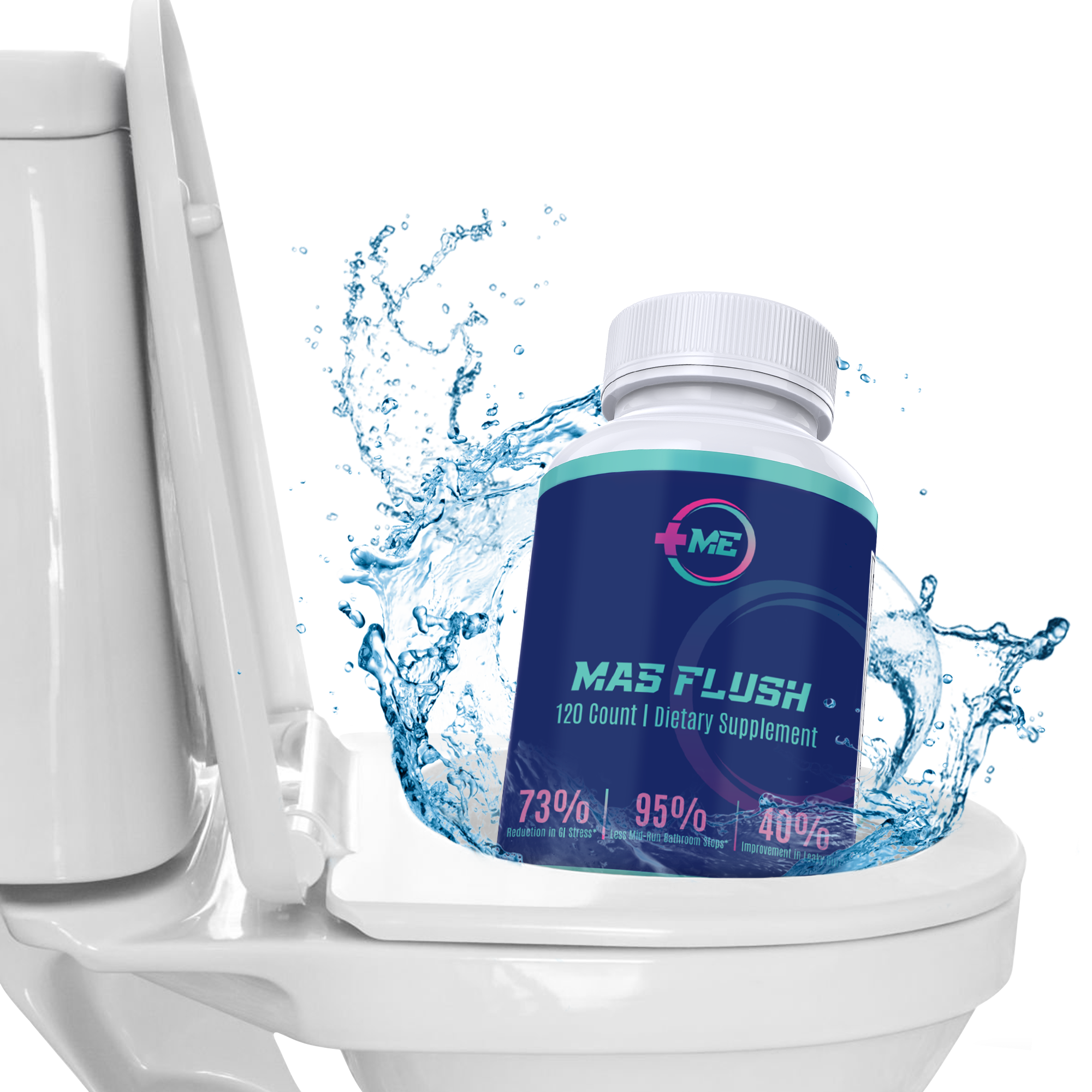It’s common knowledge that if you’re racing a marathon, half marathon or an ultra, you’re going to need to refuel during the race with gels, fluids, and other forms of carbohydrates.
In case you need a quick refresher, this is because glycogen is the primary energy source we use when running at marathon pace or faster.
Other possible sources of energy, like fats, are harder for the body to breakdown into usable energy. So, they are not very efficient and can’t supply energy quickly enough to sustain the body’s demands.
The problem with glycogen is that we can’t store enough to get us through the entire race.
Here’s so quick math to illustrate.
- We know from research that we can store between 1320 kcal to 2020 kcal of glycogen.
- Depending on your weight and fitness, running utilizes about 1kcal per kilogram of bodyweight per kilometer run.
Let’s say you weight 175 pounds (80kg) you would thus need about 3360 kcal (80kg x 42 km) to make it through the race
2020 kcal stored < 3360 kcal needed = 1340 calorie shortage.
Now, the simple solution to this would seemingly be to just continuously replenish your glycogen stores during the race with gels and fluids that contain carbohydrates.
But, if you’ve ever raced before, you know this isn’t quite as easy as it sounds.
Why You Can't Just Take as Many Gels as You Want
The difficulty with using gels and other carbohydrates during a race is that there is a limit to how many calories you can process within a certain time-frame.
Your body can only digest and process around 350 calories per hour when running.
Even worse, this number dwindles the harder your run and the more tired you get. So, in the latter stages of a race this number might be only 250 calories per hour.
This happens because blood is needed to digest food in the stomach.
As you run faster and longer, the muscles you use for running require more and more blood to maintain pace. Therefore, your body shunts blood away from the stomach and to the working muscles.
Without blood, the stomach cannot digest efficiently.
That means even if you ingested 500 calories every hour, you might only be able to use 250 to 350 of the calories.
Unfortunately, that unused glycogen that you’re not able to process doesn’t just wait around until your stomach has more time to digest it.
Instead, the unabsorbed carbohydrates pull water into the intestines, causing a laxative effect, bloating, and discomfort.
This is one of the biggest mistakes runners make when trying to avoid bonking. They take too many gels or other carb sources and they aren’t absorbed or result in GI distress.
How to Get More Efficient at Absorbing Glycogen
Luckily, there are some things you can do to help you absorb and digest more glycogen:
Option 1: Train your stomach
This may seem obvious, but training your stomach to digest carbohydrates during exercise is one of the main reasons you need to practice your nutrition strategy during training.
In essence, you’re training your gut as well as you physical fitness.
Research shows that runners who systematically train their gut experience significantly fewer GI issues and can absorb up to 30% more carbohydrates during races.
Here’s how to practice and train your gut….
Week 1-2: Baseline Building .
Start with one “gut training day” per week during a long run or tempo session.
Begin with 30-45g of carbohydrates per hour using a 2:1 glucose-to-fructose ratio (more on this below). Practice consuming 150-200ml of fluid every 15-20 minutes.
Week 3-4: Volume Increase
Increase to 60g carbohydrates per hour while maintaining the same fluid intake pattern.
Studies show this level can be reached comfortably by most runners within 2-4 weeks of consistent practice.
Week 5-6: Race Simulation
Push to your race-day target (typically 60-90g/hour for marathon runners).
Research demonstrates that athletes who practice consuming large volumes during training show improved gastric emptying and reduced perception of fullness.
Studies indicate that this progressive approach can reduce gastrointestinal symptoms by 26-47% and improve carbohydrate absorption by 45-54%.
Option 2: Optimize your carbohydrate type
The second option is to optimize the types of carbohydrates you’re using during the race.
Research has shown that different types of sugars are absorbed through a different transport mechanism. Meaning, they take different routes to get absorbed.
A good way to visualize this is thinking about traffic.
If you only have one road leading to the entrance to the park that can let in 50 cars per hour and then you split that road into two entrances, each of which can still let in 50 cars per hour, you drastically improve the speed at which you can get all the cars through.
This means if you combine different types of sugars, you can prevent some of the backlog that creates these GI issues.
The latest science supports that the most efficient combination appears to be fructose and glucose at anywhere from a .7 to 1.1 to 1 ratio of fructose to glucose.
If you have suffered from GI issues while taking gels or want to increase your overall glycogen intake, I highly recommend finding a gel or drink mix with this ratio.
Option 3: Targeted Probiotics
Recent research has demonstrated that specific probiotic strains can significantly enhance carbohydrate absorption and metabolism during endurance exercise.
The two most-researched strains of probiotics when it comes to running have been…
- Bifidobacterium longum
- Advanced formulations such as ProbioSEB Duo
Here’s a look at what the literature says about these strains of probiotics…
Enhanced Carbohydrate Processing
- 1 Research Paper
- Significant Effect
A landmark randomized controlled trial found that…
Probiotic supplementation increased mean total carbohydrate oxidation from 1.87 grams per minute to 2.20 grams per minute during 2-hour endurance sessions [1].
This enhanced utilization occurs because probiotics increase both the abundance and activity of sodium-glucose transporter 1 (SGLT1).
SGLT1 is the key mechanism responsible for glucose absorption in the intestine.
Thus, having more total available and more active SGLT1 increases carbohydrate absorption rates.
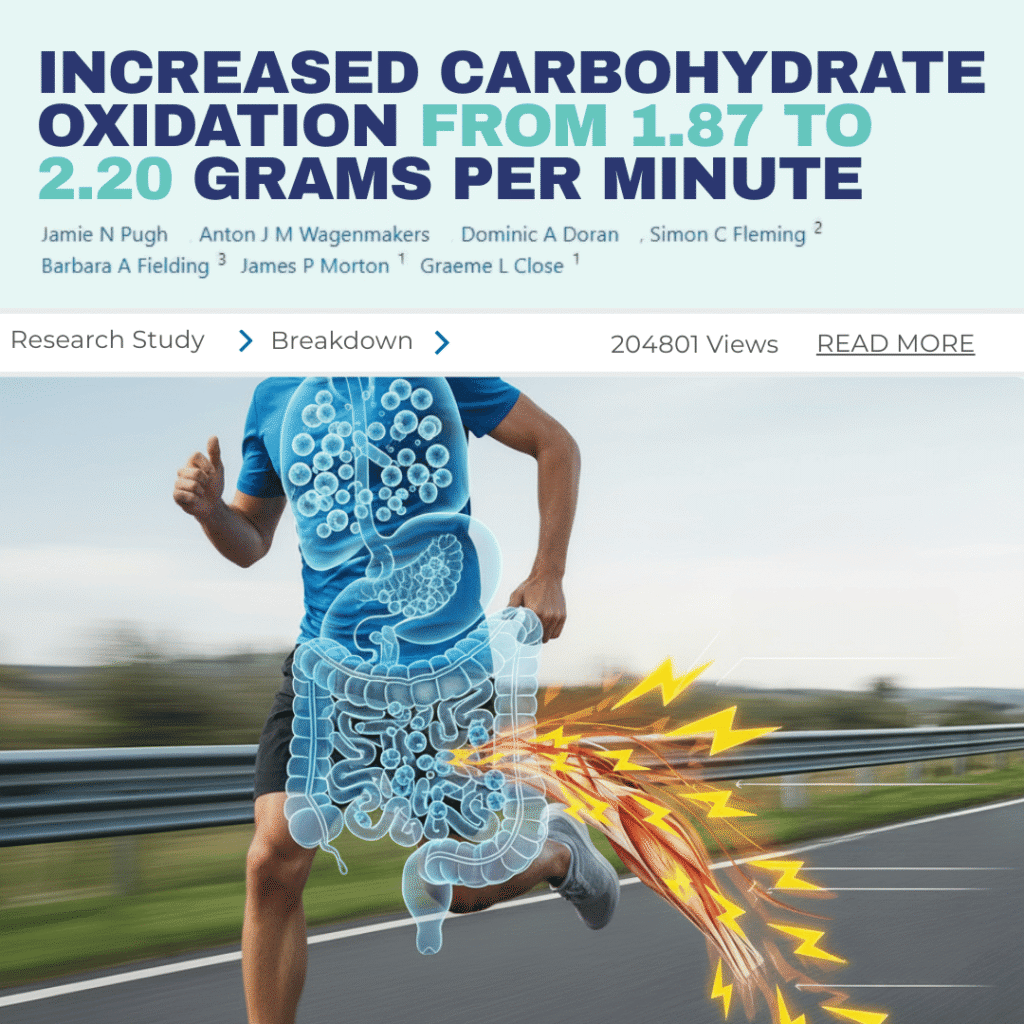
Muscle Glycogen Sparing
- 2 Research Paper
- Significant Effect
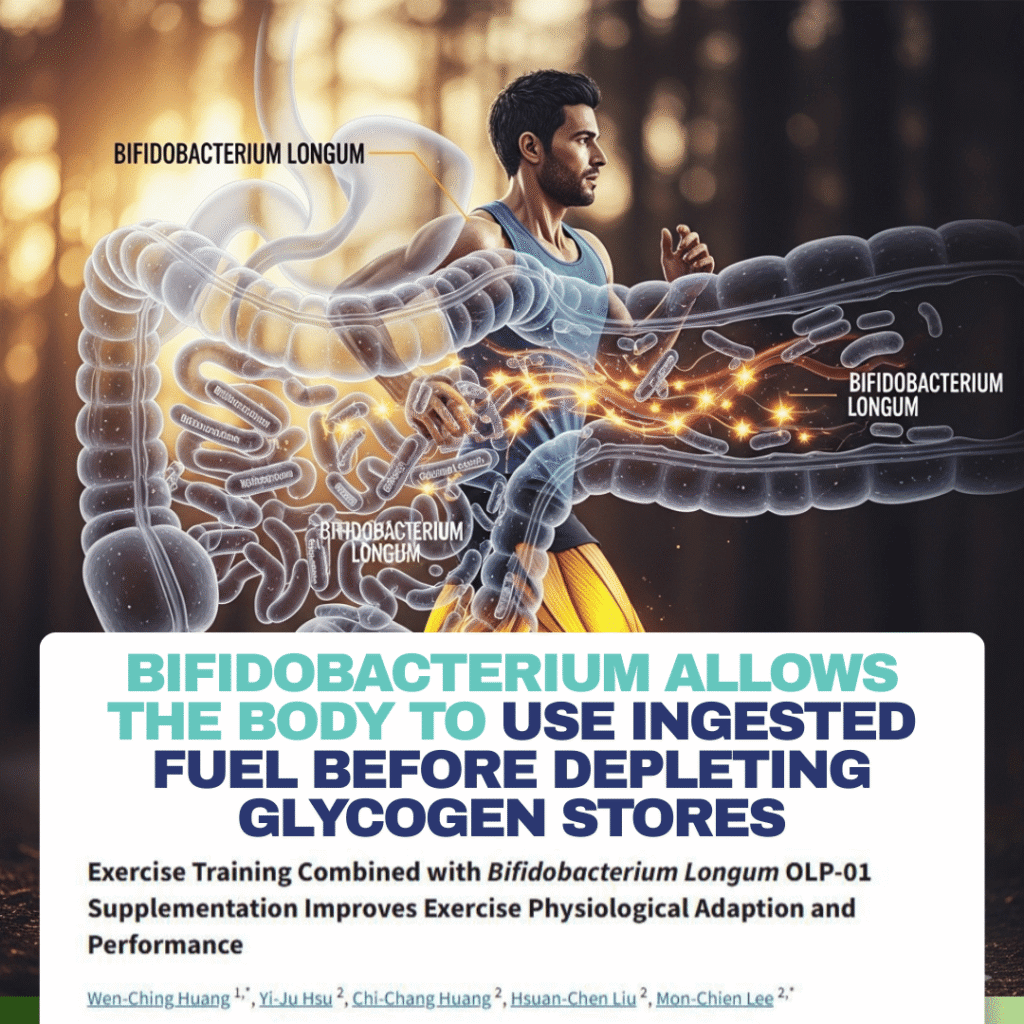
Bifidobacterium longum research shows particularly impressive results for endurance athletes.
Studies [2] found that this strain improved exercise markers associated with fatigue, such as…
- Decrease in lactate build-up
- Reduced ammonia levels
- Less glycogen depletion
The data has also demonstrated that the enhanced carbohydrate absorption allows the body to rely more heavily on ingested fuel rather than depleting precious muscle glycogen stores.
This helps prevent reductions in performance that result when the body senses glycogen levels depleting.
Gut Barrier Integrity & Nutrient Absorption
- 3 Research Papers
- Significant Effect
Finally, research shows that specific Bifidobacterium strains help keep your gut lining strong. [3].
This improved gut barrier integrity prevents the “leaky gut” syndrome that affects up to 70% of endurance athletes.
In layman’s terms, leaky gut is what happens when stress in the stomach from running causes intestinal damage in your gut lining that allow things to pass through that normally shouldn’t.
Research has also shown that runners who supplemented with bifidobacteria saw a reduction in the severity of GI symptoms during training as well as a reduction in the duration of GI symptoms post-race [4], [5].
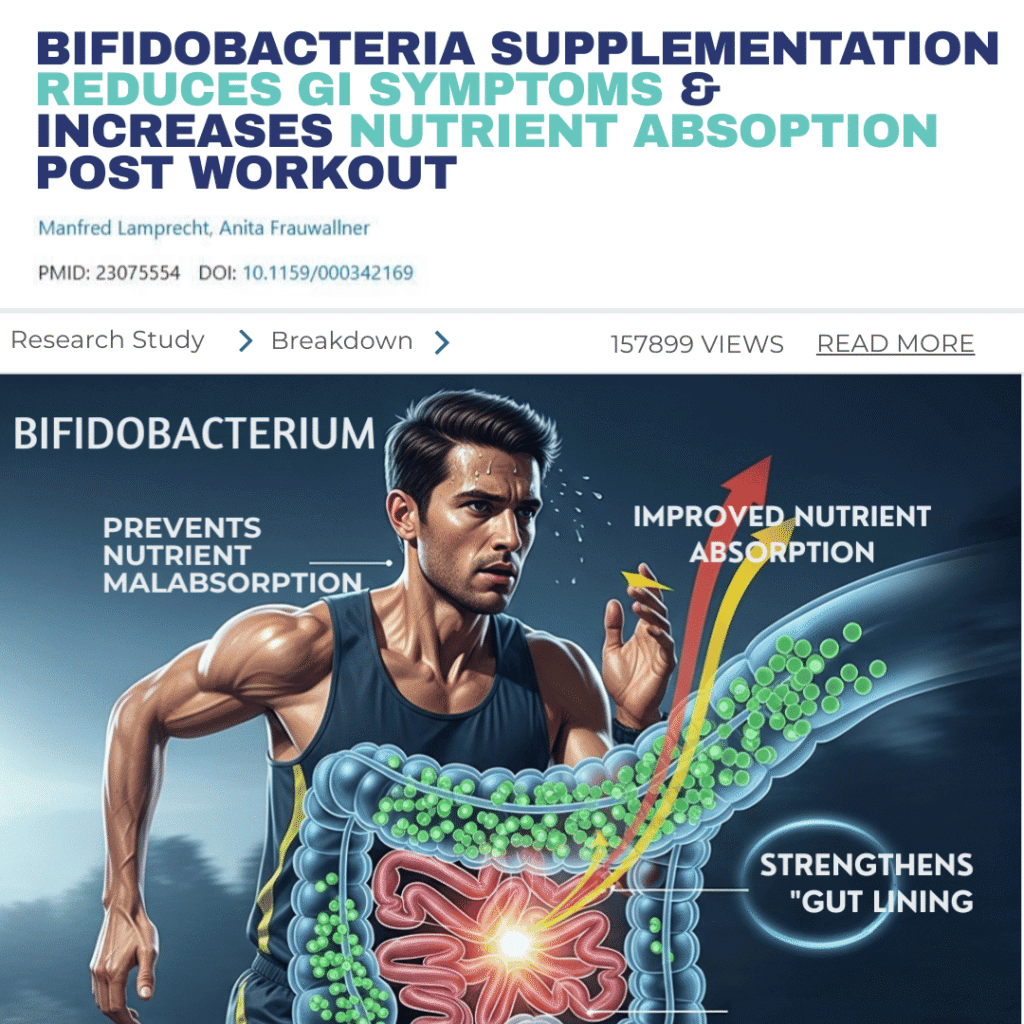
That's why we created mas flush
MAS Flush is More Than Just a Probiotic
We’ve carefully chosen the specific strains of bacteria and yeasts proven to help the most for athletes.
Then we combined them with cutting-edge ingredients that help improve all the unique aspects of gut health runners and endurance athletes face.
Stop Worrying About Carrying Toilet Paper or Finding Place to Hide
Every runner fears starting a run without nearby bathrooms.
Frequent needs to go to the bathroom early in a run are usually caused by not being able to quickly digest the foods you ate for dinner or when your digestive system isn’t able to keep up and you have inconsistent bathroom times.
MAS Flush contains Psyllium seed husks, which when taken in the evening helps make bowel movements easier and more consistent.
It can also help add bulk to stool, which helps relieve the feeling of needing to go to the bathroom. This is especially helpful due to the jostling that occurs in the digestive tract during running.
Taking just two MAS Flush capsules after dinner will make it easy to go to the bathroom as soon as you wake up so you can virtually eliminate needing to go to the bathroom during your runs.

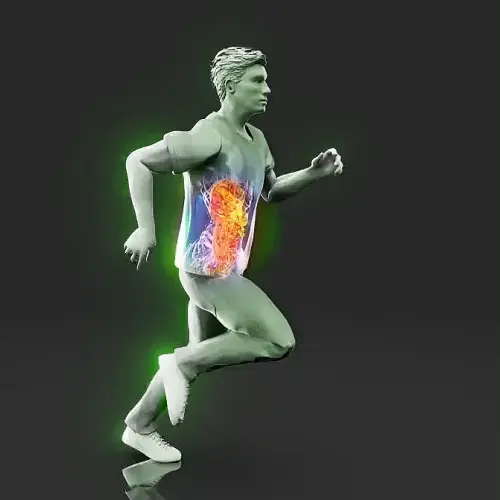
Eliminate stomach pain during and after races
Put an end to stomach pain and cramping during and after hard workouts that lead to you slowing down and not getting the most from your performance.
Stomach issues during races and hard workouts often happen for two reasons.
First, endotoxins (bacterial toxins) are released during strenuous, long-duration exercise which lead to cytokine release, oxidative stress, and altered gastrointestinal function.
Second, internal and exertional heat stress causes blood to be redistributed away from the digestive system to help with thermal regulation. As a result, lack of blood supply stresses the gut, which results in bathroom and stomach issues.
MAS Flush’s combination of Bifidobacterium Longum and New Zealand Blackcurrant have been shown in research to
- Reduce total gastric distress in runners by 73%
- Reduce endotoxin unit levels during races
- Reduce the duration of GI symptoms post-race
Fix Bloating & Digestive Issues While Absorbing More of the nutrients you consume
Bloating and digestive issues occur more often in endurance athletes because the fuel we need to train and recover often comes from difficult-to-digest foods such as plant fibers, complex carbohydrates, and proteins.
Usually, this is caused by not producing enough of the enzymes that help break down these foods.
Our endurance-focused digestive enzyme blend is specifically designed to help your body naturally digest the foods you need to fuel your training while improving your gut microbiota to create a more favorable environment in your stomach.
The enzymes in MAS Flush have been shown in research to…
- Break down food and extract nutrients, making it easier for the body to absorb.
- Improve the integrity of the gut lining, which helps prevent the leakage of undigested food particles (often called leaky gut) and enhances nutrient absorption.
- Reduce gut inflammation to increase the absorption of micronutrients like calcium and iron.
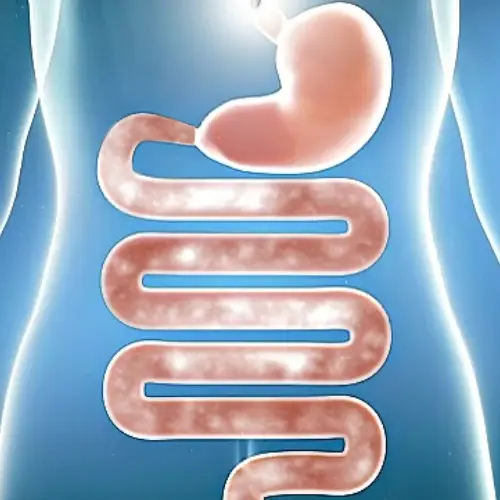
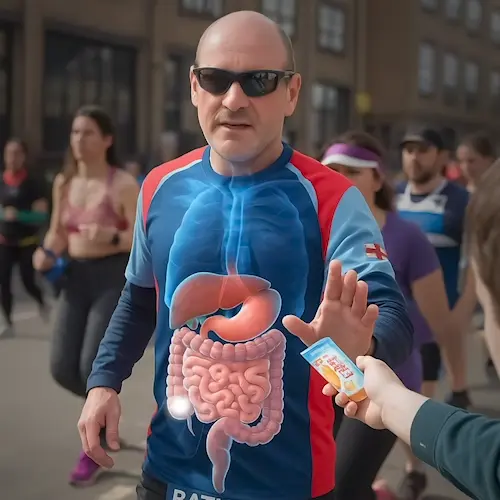
No more stomach issues taking gels and other carbohydrates during your race
One of the most difficult things about racing half, full and ultra marathons is taking in enough fuel to keep your glycogen levels topped off without causing stomach issues.
All that simple sugar is difficult for your body to process quickly, which is a main contributor to why many runners suffer to fuel properly during races.
The included Bifidobacterium in MAS flush has been shown in research to improve carbohydrate absorption and metabolism during endurance races, potentially sparing muscle glycogen during prolonged exercise.
Additionally, Bifidobacterium may help maintain gut barrier integrity, reduce gastrointestinal distress, and improve nutrient absorption.
Eliminate post workout stomach issues so you can refuel easier
There’s a reason we often refer to hard workouts as “gut-busting”. That’s because they often leave us with stomach discomfort after the workout.
This happens because after a hard training run, blood is still being shifted away from the stomach to aid in muscle recovery.
This leaves fewer enzymes available to break down your meals.
It’s also why you’re often not hungry for hours after hard workouts.
The digestive enzymes in MAS Flush have been shown in research to reduce post-workout stomach discomfort so you can jump start your recovery process with the nutrients your muscles need.

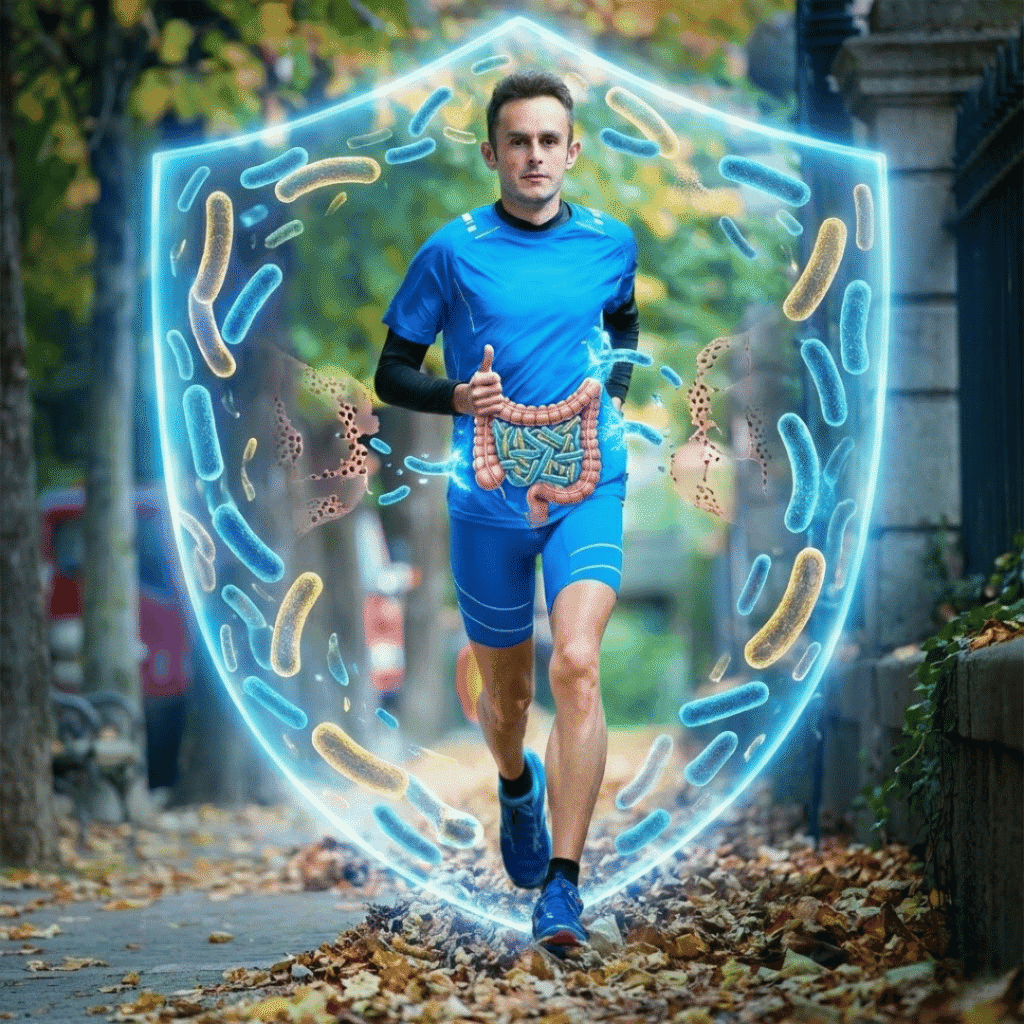
Reduce The Occurrence of Colds and other immune issues
Hard training temporarily weakens your gut lining, allowing inflammatory compounds to leak into your bloodstream and suppress your immune system.
This is why runners tend to catch the cold and flu more when training hard.
The probiotics in MAS Flush help seal these gaps and strengthen the gut lining to prevent these inflammatory compounds from entering the blood stream
It also helps cultivate and prime virus fighting cells so your body is more capable of fending off the pathogens that cause getting sick.
Consistent supplementation has been shown in research to help you spend less time recovering from illness and more time building fitness.
Stop worrying about carrying toilet paper or finding places to hide

Every runner fears starting a run without nearby bathrooms.
Frequent needs to go to the bathroom early in a run are usually caused by not being able to quickly digest the foods you ate for dinner or when your digestive system isn’t able to keep up and you have inconsistent bathroom times.
MAS Flush contains Psyllium seed husks, which when taken in the evening helps make bowel movements easier and more consistent.
It can also help add bulk to stool, which helps relieve the feeling of needing to go to the bathroom. This is especially helpful due to the jostling that occurs in the digestive tract during running.
Taking just two MAS Flush capsules after dinner will make it easy to go to the bathroom as soon as you wake up so you can virtually eliminate needing to go to the bathroom during your runs.
Eliminate stomach pain during and after races

Put an end to stomach pain and cramping during and after hard workouts that lead to you slowing down and not getting the most from your performance.
Stomach issues during races and hard workouts often happen for two reasons.
First, endotoxins (bacterial toxins) are released during strenuous, long-duration exercise which lead to cytokine release, oxidative stress, and altered gastrointestinal function.
Second, internal and exertional heat stress causes blood to be redistributed away from the digestive system to help with thermal regulation. As a result, lack of blood supply stresses the gut, which results in bathroom and stomach issues.
MAS Flush’s combination of Bifidobacterium Longum and New Zealand Blackcurrant have been shown in research to
- Reduce total gastric distress in runners by 73%
- Reduce endotoxin unit levels during races
- Reduce the duration of GI symptoms post-race
Fix Bloating & Digestive Issues and Absorb More of the nutrients you consume

Bloating and digestive issues occur more often in endurance athletes because the fuel we need to train and recover often comes from difficult-to-digest foods such as plant fibers, complex carbohydrates, and proteins.
Usually, this is caused by not producing enough of the enzymes that help break down these foods.
Our endurance-focused digestive enzyme blend is specifically designed to help your body naturally digest the foods you need to fuel your training while improving your gut microbiota to create a more favorable environment in your stomach.
The enzymes in MAS Flush have been shown in research to…
- Break down food and extract nutrients, making it easier for the body to absorb.
- Improve the integrity of the gut lining, which helps prevent the leakage of undigested food particles (often called leaky gut) and enhances nutrient absorption.
- Reduce gut inflammation to increase the absorption of micronutrients like calcium and iron.
No more stomach issues taking gels and other carbohydrates during your race

One of the most difficult things about racing half, full and ultra marathons is taking in enough fuel to keep your glycogen levels topped off without causing stomach issues.
All that simple sugar is difficult for your body to process quickly, which is a main contributor to why many runners suffer to fuel properly during races.
The included Bifidobacterium in MAS flush has been shown in research to improve carbohydrate absorption and metabolism during endurance races, potentially sparing muscle glycogen during prolonged exercise.
Additionally, Bifidobacterium may help maintain gut barrier integrity, reduce gastrointestinal distress, and improve nutrient absorption.
Eliminate post workout stomach issues so you can refuel easier

There’s a reason we often refer to hard workouts as “gut-busting”. That’s because they often leave us with stomach discomfort after the workout.
This happens because after a hard training run, blood is still being shifted away from the stomach to aid in muscle recovery.
This leaves fewer enzymes available to break down your meals.
It’s also why you’re often not hungry for hours after hard workouts.
The digestive enzymes in MAS Flush have been shown in research to reduce post-workout stomach discomfort so you can jump start your recovery process with the nutrients your muscles need.
Reduce The Occurrence of Colds and other immune issues

Hard training temporarily weakens your gut lining, allowing inflammatory compounds to leak into your bloodstream and suppress your immune system.
This is why runners tend to catch the cold and flu more when training hard.
The probiotics in MAS Flush help seal these gaps and strengthen the gut lining to prevent these inflammatory compounds from entering the blood stream
It also helps cultivate and prime virus fighting cells so your body is more capable of fending off the pathogens that cause getting sick.
Consistent supplementation has been shown in research to help you spend less time recovering from illness and more time building fitness.
MAS Flush Vs. Generic Probiotics
While almost any probiotic will help improve your gut health, you have unique challenges and needs as a runner that generic probiotics just don’t address.
|
|
|
|
|---|---|---|
| Helps alleviate needing to go to the bathroom as soon as you start running | ||
| Formulated to target endotoxins to eliminate stomach pain during races | ||
| Designed to reduce heat stress, a major cause of GI distress when racing and working out hard | ||
| Specific ingredients to improve carbohydrate absorption and metabolism while running | ||
| Advanced digestive enzymes to naturally digest fiber, complex carbs, and other difficult to digest foods |
Hundreds Have Experienced Real Relief, Peace of Mind and Results
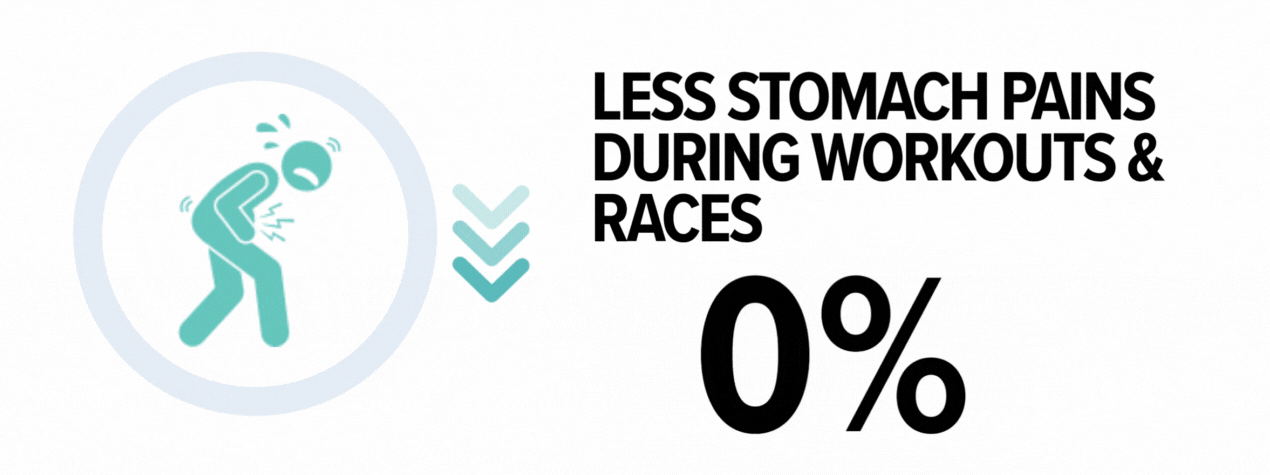
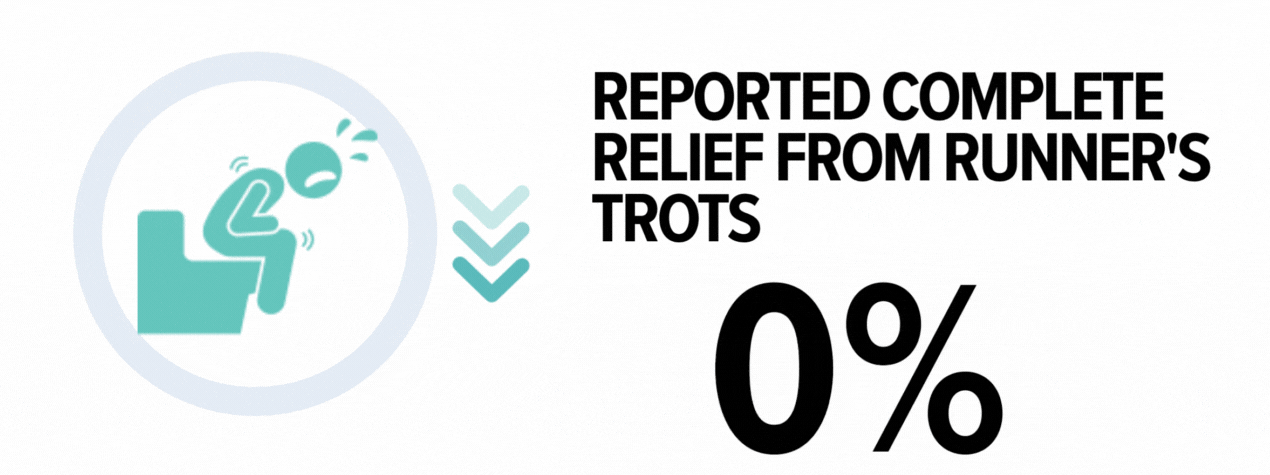
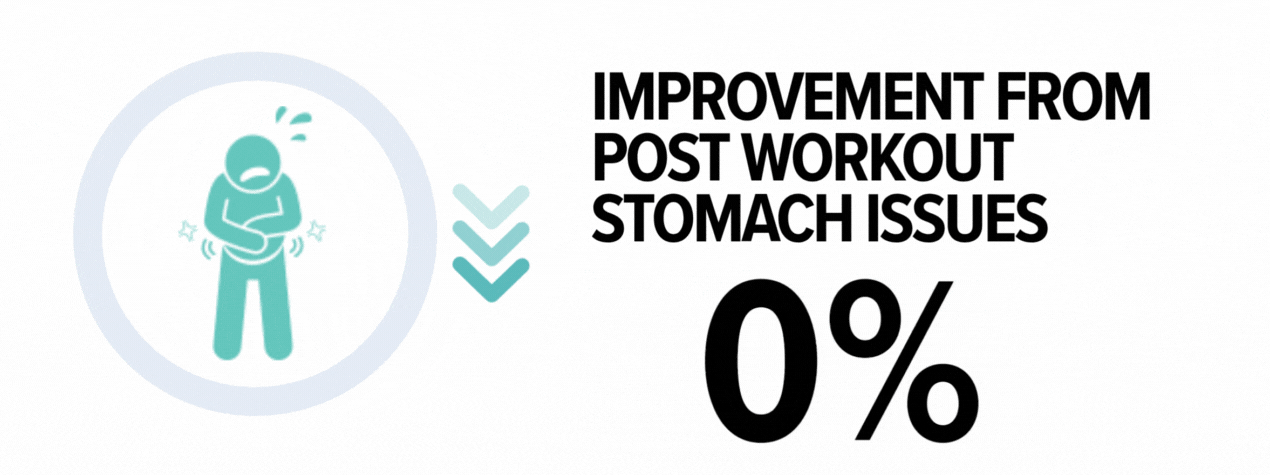

- Olivia H.
I honestly can’t believe this product worked so well. Before using flush, I’d be scrambling back home to go to the bathroom at least 3 days per week. It made me scared to go to group runs or even try out new trails for fear of not having a bathroom nearby. I’ve been using for 3 weeks now and not once have I had to go to the bathroom once I started running. This is such a relief!
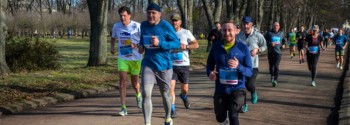
- Teddy Adler
I tried this product during the beta launch because I really struggled with stomach pain when racing and even after hard workouts. There were times after hard workouts that it would take hours for my stomach to feel normal. MAS Flush changed everything. I’ve been using it for a month and I haven’t had any stomach pain after workouts. I’m so glad I found this.

- Emma M.
I’ve tried countless gut products, but this is the one that actually worked. For the first time in years, my digestion feels normal. No more discomfort, bathroom urgency, or unpredictable bloating. It’s been such a relief. This formula actually works.




4.9/5.0 513+ Happy Athletes
Ready for The Probiotic Created Specifically for Endurance Athletes
- Makes bowel movements more consistent so you never start your runs needing to go
- Practically eliminates gastric distress during workouts and races
- Significantly improves digestion of hard-to-digest foods
- Reduces ‘leaky gut’ by up to 40%
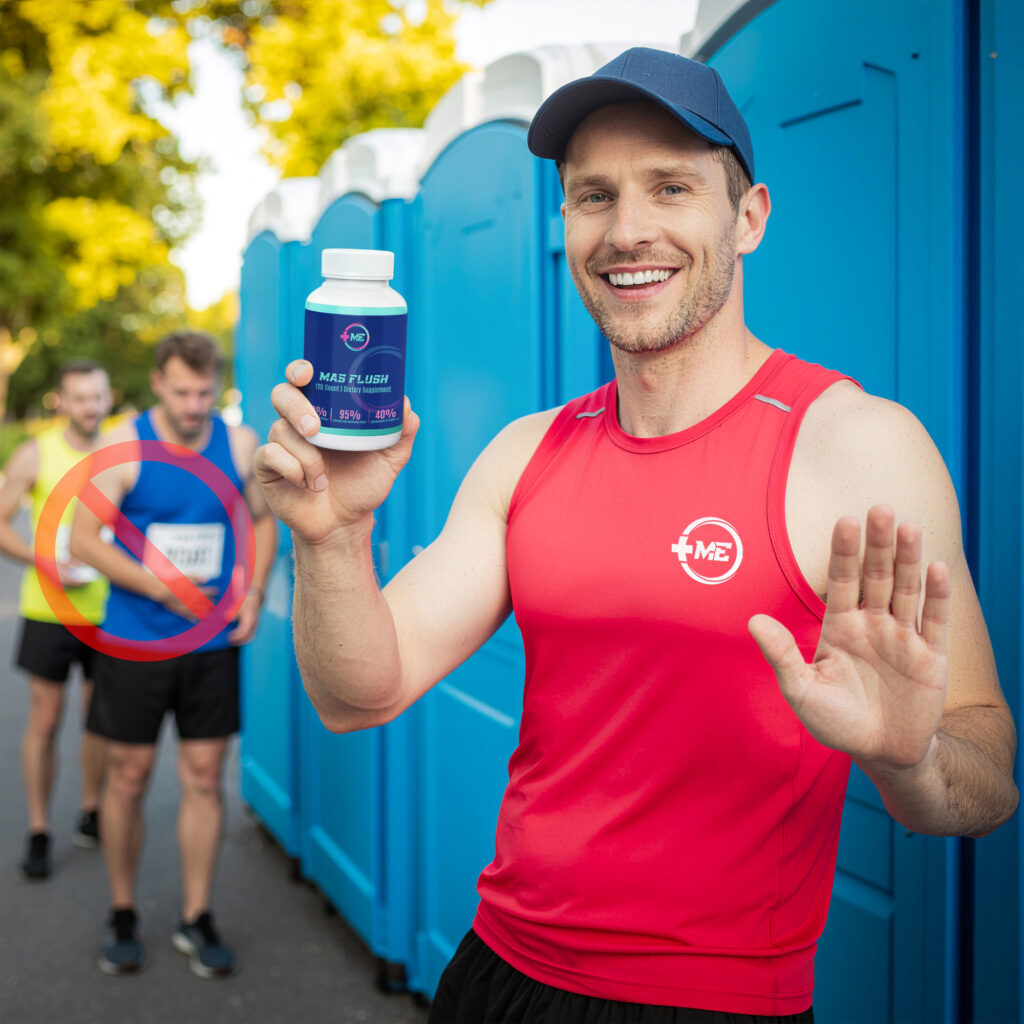
The Bottom Line
Fueling is a critical component to your performance at every distance from the half marathon to the ultra.
Luckily, your digestive system responds to progressive training just like your cardiovascular and muscular systems.
And the research is pretty clear that athletes who systematically train their gut tolerance experience significantly fewer race-day GI issues and maintain higher carbohydrate absorption rates when racing.
So, start your gut training protocol immediately, regardless of where you are in your current training cycle.
Even four weeks of consistent practice can dramatically improve your digestive performance during endurance events.

